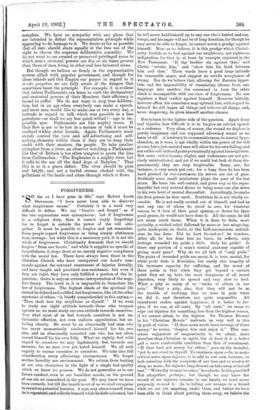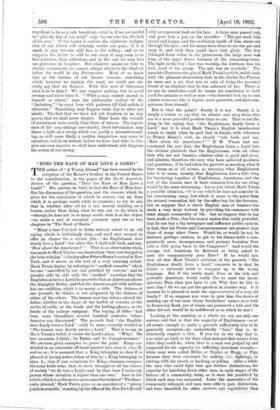FORGIVENESS.
0 far as I have gone in life," says Robert Louis Stevenson, " I have never been able to discover what forgiveness means." Certainly it is a word very difficult to define. We say " forgive and forget" as if the two expressions were synonymous ; but if forgiveness is a religious duty, then it cannot imply forgetting, for to forget is outside the power of the will alto- gether. It must be possible to forgive and yet remember. Some people regard forgiveness as being simply abstinence from revenge ; but while this is a necessary part, it is not the whole of forgiveness. Christianity demands that we should forgive "from our hearts," and while it supplies no specific of forgetfulness, it stops short at no merely negative compliance with the moral law. There have always been those in the Christian Church who have interpreted our Lord's com- mands against the outward resentment of injuries literally, and have taught and practised non-resistance; but even if they are Fight, they have only fulfilled a portion of the in- junction ; theirs is only an extreme interpretation of the nega- tive theory. The truth is, it is impossible to formulate the law of forgiveness. The highest ideals of the spiritual life cannot be defined and codified, but forgiveness, like all the other mysteries of ethics. "is briefly comprehended in this saying,— 'Thou shalt love thy neighbour as thyself.' " If we want to study our right attitude towards those who trespass against us, we must study our own attitude towards ourselves. Now what most of us feel towards ourselves is not en- thusiastic affection, not even uniform approbation, but un- failing charity. He must be an abnormally bad man who has never momentarily condemned himself for his own sins, and an abnormally conceited one who has not often cursed himself for his own folly. What we rightly feel with regard to ourselves we may legitimately feel towards our enemies, for no man ever yet hated himself. We all seek eagerly to excuse ourselves to ourselves. We take into full consideration every alleviating circumstance. We forget neither heredity nor environment. We refrain from looking at our own characters in the light of a single bad quality which we know we possess. We do not generalise as to our future conduct, even in our humblest moods, on the ground of one sin we committed in the past. We may know we have been cowards, but till the breath is out of us we shall recognise in ourselves potential heroism. A man may abuse himself when he is repentant, and ridicule himself while he feels ashamed, but he will never hold himself up to any one else's hatred and con- tempt, and his anger will not be of long duration, for though he may never be able to forget, he cannot nurse a grudge against himself. Now, as we believe, it is this grudge which Christi- anity forbids us to feel against our neighbours, not righteous indignation, for that is, at least by example, enjoined in the New Testament. "If thy brother sin against thee," said Christ, "rebuke him," and "show him his fault between him and thee." These words leave a good large latitude for reasonable anger, and suggest no servile acceptance of wrong. Nor do we believe that, allowing for Eastern hyper- bole and the impossibility of translating idioms from one language into another, the command to turn the other cheek is incompatible with our view of forgiveness. No one registers a final verdict against himself. However bitterly, however often, his conscience may upbraid him, with regard to himself he still hopes all things and believes all things, and, never despairing, he gives himself another chance.
But to turn to the lighter side of the question. Apart from real injuries, how difficult it is to forgive an unkind speech or a rudeness. Very often, of course, the wound we deplore is purely imaginary, and our supposed adversary meant us no harm at all. A tendency to oversensitiveness, to mental hypo- chondria, as it were, is not wholly within the power of the will to cure, but a just-minded man will allow for his own failing, and not set his self-induced pains permanently against his neigh hour. But some unkindnesses. slights, and rudenesses are not pre- cisely unintentional, and yet if we could but look at them dis- passionately they are very forgiveable. Some one, for instance, is very much put out; for a long time he has been hard pressed by circumstances, his nerves are out of gear. Suddenly some small misfortune plays the part of the last straw. He loses his self-control, and gives way to the repre- hensible but very natural desire to bring some one else down to his own level of mental discomfort. Accordingly, be snubs the first person he dare snub. Doubtless he is not wholly ex- cusable. He is not really carried out of himself, and had he met any one of whom he stood in awe, for whatever reason, be it love of their good opinion, or desire for their good graces, he would not have done it All the same, he did not mean much harm. When it is done he feels, most probably, a wicked relief followed by more or less misgiving, quite inadequate, no doubt, to the half-unconscious unkind- ness he has done. Did he hurt So-and-so? he wonders. After all, he has done him no harm, he reflects, only Perhaps wounded his pride a little. Only his pride! Is there any portion of a man's mental anatomy capable of giving more pain? Why do we all talk of "only pride." The pains of wounded pride are never, it is true, mortal, for while pride feels it flourishes, but surely this tenacity of life increases capacity for suffering, and the worst of these pains is that when they get beyond a certain point they set up hate, the most dangerous of all moral disorders, very likely to spread and very slow to heal. What a pity so many of us " strike at others in our pain." What a pity, also, that they will not be at the trouble of realising that we were in pain when we did it, and therefore not quite responsible. All resentment makes against happiness; it is better to for- give, if we can, at all costs. By " all costs " we mean to wipe out injuries for something less than the highest reason, if we cannot attain to the highest. Sir Thomas Browne in his "Christian Morals" instructs us very well in this by-path of virtue. " If thou must needs have revenge of thine enemy," he writes, "forgive him and enjoy it." This con- scious enjoyment of magnanimity is, we admit, more Aurelian than Christian in spirit, but at least it is a better and a more comfortable condition than that of resentment. .` If thou hast not mercy for others," goes on the moralist, "yet be not cruel to thyself. To ruminate upon evils, to make critical notes upon injuries, is to add to our own tortures, to lash ourselves with the scorpions of our foes and to resolve to sleep no more ; for injuries long dreamt on take away at last all rest." " Write thy wrongs in ashes," he exhorts. Is this possible P Not altogether, perhaps ; but though we may know the record of our injuries remains in our hearts, we need never purposely re-read it. As to telling our wrongs to a friend while we are yet starting under them, and before we have been able to think about putting them away, we believe the
expedient to be as a rule beneficial,—that is, if we are careful to " give the key of our mind" only "to one who has the lock of his own." If the injury is serious, the righteous indigna- tion of our friend will certainly soothe our pain ; if it is small, it may become still less in the telling ; and as we suppress the desire to add to our story it may seem to us first pointless, then ridiculous, and in the end we may lose our grievance in laughter. But whatever means we take to obviate resentment, we cannot always attain to the ideal set before the world in the Paternoster. Most of us know that at the bottom of our hearts remains something which, however we explain the word, we could not sin- cerely say that we forgave. With this root of bitterness what is to be done? We can suggest nothing but to avoid revenge and there leave it. " What a man cannot amend in himself or others," says the philosophic author of the " Imitation," "he must bear with patience till God ordain it otherwise." Something may happen some day to alter our minds. The fact that we have not 'yet forgiven in no way proves that we shall never forgive. Time heals the wounds of resentment more surely than those of sorrow. The experi- ence of life may enlarge our charity, fresh information may throw a light on a wrong which was partly a misunderstand- ing, or, still more likely, a sudden temptation may come to ourselves, and in an instant,. before we have had time to for- give our own impulse, we shall have understood and forgiven the action of our enemy.











































 Previous page
Previous page